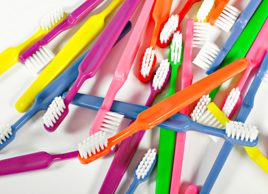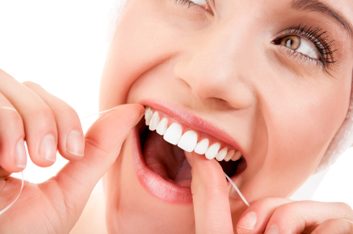
1. Brush your teeth regularly (and properly!)
Though it may sound obvious, the best way to keep cavities at bay is to keep your teeth clean. Brush your teeth at least twice a day, ideally after every meal-and be thorough! Dr. Harry Höediono, president of the Ontario Dental Association, says that while most people spend about a minute brushing their teeth, the ideal should be three times that. Brushing before bed is particularly important, since letting bacteria linger on your teeth overnight can allow enamel-damaging acid to form (ultimately leading to cavities). When you do brush, work carefully, from the gums to the tips of the teeth. “Don’t scrub!” says Dr. Höediono. “It’s best to use nice, gentle strokes. Scrubbing only gets at the food particles that are on the flat surfaces of your teeth. If you want good results, start at the gums.” Also be sure that you’re using fluorinated toothpaste, because fluoride helps makes your tooth enamel more resistant to decay.

2. Use the right brush
There’s no need for a fancy or expensive motorized toothbrush. Do make sure, however, that the brush you choose has soft bristles, and that you replace it every three months-or sooner if you’ve had a cold. “A soft brush promotes longer brushing times and will help you do a better job,” explains Dr. Höediono. “A hard brush can actually scratch the enamel.” Children should use brushes specifically designed for smaller hands and mouths, while older adults with dexterity problems may prefer a brush with a larger handle. After you’ve finished brushing, rinse your brush thoroughly and leave it where it can dry: a wet brush can breed bacteria.

3. Floss daily
According to Dr. Höediono, careful flossing is the key to good oral health. That’s because some of the worst cavities are the ones that form between the teeth. “I can’t stress enough how important it is,” he says, explaining that even with careful brushing, food particles can get caught between teeth-and that can cause bacteria to grow. Dr. Höediono recommends flossing before brushing in order to loosen debris that can then be whisked away with a brush. “If you floss just once a day, you will also help prevent gum disease,” he adds. If your gums bleed when you floss, keep at it – while they may be inflamed at first, regular flossing should help stem the bleeding. Dr. Höediono suggests making flossing a family activity by doing it together while watching television.

4. Avoid sugary, sticky snacks
If your mid-afternoon pick-me-up is a can of pop or a bag of candy, you could be doing your teeth (and your waistline) a disservice. That’s because sugary snacks and drinks cause acid to form in your mouth, and that can lead to tooth decay by wearing away at the enamel (diet and sugar-free soft drinks and juices won’t get you off the hook, because they’re still high in acid!). Dr. Tony Iacopino, dean of the Faculty of Dentistry at the University of Manitoba, says it’s important to avoid foods that are high in sugar in general, but having them on their own can spell trouble for your mouth. Instead, only have your sweet stuff at the end of a meal, when your mouth will already be bathed in the saliva it needs to whisk away cavity-causing debris. “The more time you keep sweets or sticky foods in your mouth, the worse it’s going to be, because you’ll be creating acid for longer,” he says. If you do have a particularly sweet or sticky snack, Dr. Iacopino recommends brushing afterwards; if that’s not possible, rinse your mouth with water.

5. Quit smoking
Besides putting your health at risk and dulling your smile, smoking can also raise your risk of cavities and oral cancer. “A lot of people, especially young women, don’t realize how smoking can affect their oral health,” say Dr. Höediono. “When you smoke, you’re taking in noxious substances through the mouth. Bacteria sticks to that, and then begins to create acid.” It then starts wearing away at tooth enamel, which can result in cavities and gum disease. “Tobacco products can also cause inflammation in the mouth, and that can lead to specific types of oral cancer,” he says, adding that 1,000 Canadians died of oral cancer in 2009. (Chances of survival are higher if the disease is caught early.)

6. Visit your dentist regularly
“You would be surprised by how often people don’t go,” laughs Dr. Höediono, who recommends people have checkups twice a year. He explains that although cavities are simple to fix, they can develop and progress quickly, and that can make things more complicated. “If you wait, they can get deeper and lead to nerve problems,” he says, adding that dentists also check for problems like oral cancer and other illnesses that may be visible in the mouth. Dr. Iacopino adds that anyone who has trouble keeping their teeth clean-due to age, or problems with hand-eye coordination-should see their dentist more often than every six months.
Related:
• Are you making these brushing mistakes?
• Are you flossing the right way?
• 6 ways to soothe sensitive teeth
